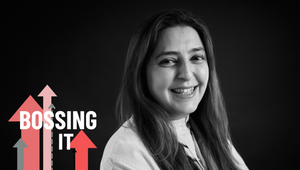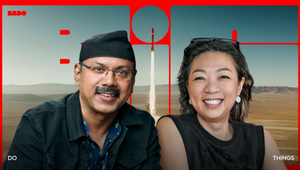
5 Minutes with… Josy Paul

Beneath his thoughtful demeanour beats the heart of a rebel – Josy Paul is not afraid to get destructive in order to get creative. The Chief Creative Officer and Chairman of BBDO India is a big believer in the importance of questioning oneself and established norms and encourages his creatives to do the same. Perhaps it stems from his background as a physics student, prodding and poking the fabric of reality armed with the rigours of the scientific method? Or perhaps it was his early immersion in the world of fiction that nurtured an imagination that could see beyond convention. Whatever the case, he’s shepherded work that’s broken barriers and busted all sorts of taboos in Indian society.
LBB’s Laura Swinton interviewed him to learn more.
LBB> I read that you said you were born during an Earthquake! I can’t help but feel that’s tremendously poetic, like the beginning of some sort of heroic saga. Do you feel that that has had an impact on how you see yourself or your life?
JP> Hahaha! It’s generous of you to say that. The truth is it’s nothing. I was born with an excited tremor that I could not understand. When people made fun of me in school and college, I was forced to explain. So I chose the poetic path and told them I was born during an earthquake. It sounded good. My trembling ‘weakness’ became a useful strength.
LBB> What was your childhood like? Where did you grow up and what kind of kid were you? And was creativity a big part of your upbringing?
JP> I grew up reading anything and everything in a household where everybody read even at the dinner table. It was an interesting diet of Enid Blyton, Famous Five, Five Find-Outers, Hardy Boys and Biggles and then MAD Magazine and PG Wodehouse mixed with the wonderful world of Hindi movie dialogues, music and lyrics. It was a heady cocktail of sharply different imaginations and it affected me deeply as a school-going kid.
We lived in a self-contained gated colony in Mumbai with full access to a central playground with its football and cricket tournaments and professional underground badminton and indoor sports facilities. I was an active sports person who was always reminded by my parents to study. I eventually topped my school making my parents very happy.
LBB> As I understand it you studied physics at university. Perhaps not the most obvious subject for an advertising creative – but then on the other hand I guess it’s the study of creation! What drew you to physics and do you think that the experience has influenced your approach to creativity in any way?
JP> Studying Physics at St Xavier’s College in Mumbai (a Jesuit institution and one of India’s top five colleges) was a defining point in my life. Xavier’s was a highly creative environment where students were given the freedom to question everything and create new things. I remember how my friend and I co-created the Rose Day at Xavier’s which is a tradition that goes on even today and is followed by many colleges in India.
Studying Physics gave me a conceptual and philosophical edge in my search for creative meaning. Quantum Physics and Heisenberg's uncertainty principle and other such ideas opened my mind to scientific enquiry and the world of hypotheses and the power of observations. This combination of creativity and science altered my mind. It was like a drug and I was in a four-year stupor.
LBB> What prompted the jump from man of science to ad man?
JP> It was a chain of accidents. I stumbled upon a set of calligraphy pens at home left behind by an uncle. This led me to do an experimental calligraphic poster for the Social Service League at St Xavier’s College. Which led to the poster being recognised by the Counsel General of Germany who was passing through the college. Which led to me being invited for high tea to the German Consulate. Which got the leadership at the college to take notice of me. This led to numerous clubs in the college asking me to help them with their publicity. And then, suddenly, everyone started calling me an artist – which I was not!
Then one day I happened to go to an art exhibition with my college friends. But the art gallery had been taken over by the advertising club of Mumbai - to showcase the winning campaigns of that year. I saw ads after ads that were so brilliant and creative. The work seemed to be calling out to me. So, when I finished college, I decided to try my luck in advertising.
LBB> And I read a lovely story that you told about one of your early job interviews (with Suresh Mullick) where he noticed your tremor and thought you were nervous. You told him it was creative vibrations! What a flash of inspiration! What did you learn from that experience?
JP> Thank you for going so deep into my world. Yes this was a time when I had virtually no work to show but was given the opportunity to meet with one of India’s greatest advertising legends and the chief creative director of Ogilvy & Mather. Suresh Mullick was a kind man. When he shook my hands, he noticed I was trembling. So, Suresh graciously told me not to be nervous of him, it’s okay. But I got carried away and shot back saying that it was not nervousness but creative vibrations. He was so taken aback he sat down laughing heartily.
Next thing I knew I had the Ogilvy job, without even opening my humble portfolio. I feel my flash of inspiration was nothing compared to Suresh’s fearless and faithful acceptance of my weakness. I owe a lot to Suresh. It always brings a tear to my eye when I think of him.
LBB> What was the best piece of advice you got when you started your career?
JP> “I give you the freedom to fail” said Kersy Katrak when he hired me at Lintas. Kersy Katrak was the man who led the creative revolution in Indian advertising. Many called him the Bill Bernbach of India.
I was 26 years old when Kersy spoke these magic words. Nobody had ever said this to me before. Suddenly, I had nothing to lose. It set me free and gave me wings.
LBB> I also read that early on you got fired for disagreeing with your boss! How do you handle dissent and rebelliousness now that you’re the boss? Do you encourage it? Do you try to channel it?
JP> Yes, I got fired twice! I lost my first job in a month for back-answering the boss, and lost my second job in two months because the boss did not like the way I looked at him!! It was weird. I was so used to Xavier’s where we could speak our mind. But the outside world was so restrictive and insecure.
Dissent and rebellion are ways to break from the past. It’s important to the creative process. Nothing is sacred. Every day I fight my own conditioning. Every day I encourage people to break something. If you can’t break something you can’t make something. My friend, advertising partner and CEO at BBDO, Ajai Jhala, always says “the idea of authority will give way to the authority of ideas”.
LBB> I gather you started BBDO India out of the back of your car – tell me about that!
JP> When we started BBDO India in January 2008, we did not have an office in Mumbai for 11 months. We had no people, no accounts. Ajai Jhala (our CEO) joined in September. RajDeepak Das (ECD, Mumbai) was still in Bangkok, but would come visiting. It didn’t make sense to have an office. Out of habit I would set out to go to work, but I had nowhere to go. So, I would travel about in my car and sit in coffee shops and meet people and discuss the future of advertising. I would have introductory meetings with prospective clients in coffee houses with the excuse that our office was being painted.
My students from the communication college, where I was a visiting faculty, would sometimes join me and present my work to prospective clients as though they were my office colleagues. It was exciting and challenging and pregnant with possibilities. That’s how we were born - from the back seat of my car. My business card still shows our address as MH-02-A-7397. That’s my car registration number.
LBB> And how did you shepherd and nurture its growth?
JP> I did not build this agency alone. There was a whole team that created it - starting with Chris Thomas, the former Chairman and CEO BBDO Asia Pacific and now the CEO of BBDO Americas. It was Chris Thomas and Andrew Robertson who offered me the opportunity to set up BBDO in India. And they backed us with faith, confidence and unending support.
The first thing was to form the right team. We spent months meeting and attracting the best talent that would finally shape BBDO India’s early years.
When we started out, Ajai Jhala and I were clear we did not want to do what was done before. There was a new and young India calling and we wanted to place BBDO at the heart of this changing new world. Young Indians everywhere were rejecting the old order. They were looking for action, not promises. They were saying ‘don’t tell me, involve me’. People wanted commitment, not words.
All this and other experiences led us to script a new working mantra for BBDO India “Create acts, not ads”.
It was a new language for Indian advertising. And it became evident in one of our very first campaigns - P&G Gillette’s ‘Women Against Lazy Stubble’ (WALS). The campaign created a major buzz in India and broke all previous sales records. WALS went on to win some of the biggest creative and effectiveness awards in the world including the inaugural PR Lion at Cannes and the inaugural Creative Effectiveness Lion. WALS helped attract worldwide interest in our young agency.
LBB> And what’s the creative culture like?
JP> A culture is only as good as its work and values. ‘Create acts not ads’ made us more socially aware and community oriented. We tried to see how brands could transform themselves in the market - by finding ways to resolve tensions and conflicts in society. This affected our culture - starting with the architecture of our place of work. Our workplace is not an office, it is an ‘ashram’ – a centre for collective creativity and community action. The architecture affected our approach. We became more inclusive. Everybody mattered. The creative development process became more circular and less linear. It led us to many new learnings and so we captured our own principles of impactful brand communications:
1. Content is king. But context is King Kong.
2. Empathy is universal currency.
3. Not just insights, it’s how you incite.
4. A Point Of View matters more than a Point of Differentiation.
5. Create acts, not ads.
LBB> What recent projects from the agency are you particularly proud of?
JP> With Mirinda #ReleaseThePressure we took on the hidden issue of ‘parental pressure’ in India. It’s about changing the conversation around depression and other teenage issues - with the help of clinical psychologists and partners.
Mirinda #ReleaseThePressure was PepsiCo India’s first big win at Cannes, and went on to win at numerous Indian and international award shows.
Visa #KindnessIsCashless and eBay #ThingsDontJudge were significant transformative campaigns of 2017 and big winners at Spikes Asia.
LBB> BBDO India was really pioneering when it comes to challenging gender stereotypes and taboos in ads, particularly with Touch the Pickle and Ariel’s Share the Load – why was that an important thing to do for you, the agency and the client?
JP> We believe brands have the power to re-arrange the world for the better. There are hidden tension points and conflicts in society that nobody wants to talk about. It may be because they are uncomfortable. But enlightened clients know the value of committing to these social dilemmas. It’s a win-win situation for society and brand when handled with great sensitivity and responsibility.
LBB> I’ve noticed in recent years that a few Indian agencies and brands have been doing some interesting stuff that portrays women and female issues in more progressive light. Is the industry at a tipping point in this, or is there still some way to go?
JP> Telecoms, technology and media are accelerating the change in Indian society like never before. There’s rising optimism and hope for a better life. At the same time, the clash of the old and the new – be it values, ambition, outlook - is increasingly visible and is adding to the stress and confusion. This is affecting marketing communications. Brands are doing their best to respond and keep pace with this volatile change, which is why we see more and more social issues entering brand communications in India.
LBB> The question of diversity in agencies, especially in creative departments. What’s the situation like in Indian agencies? Is there a push to encourage people from different socio-economic backgrounds into advertising?
JP> In India, ad agencies live in an ecosystem where we work with diverse talent that come from various parts of the country. This has been evolving naturally and healthily. There is increasing consciousness about diversity because our work needs to connect with multiple audiences in different geographical states where people speak in their own language. With the conversation around diversity on the rise, I am sure we’ll see greater sensitivity and push on this in Indian agencies.
LBB> So outside of work, what do you enjoy doing? What keeps you passionate and motivated?
JP> I don’t see what I do as work. It’s creative therapy for life. I follow the great work and ideas of artists, writers, thinkers and other agencies and I weep with joy to know that I belong to a world where we have the freedom to explore our unique identity and shape our creative self in the company of so many awesome people. I travel to schools and colleges to share this secret and tell them about self-discovery through the creative journey of advertising.
LBB> And when it comes to other people’s creative work – which artists/directors/writers/designers do you really admire?
JP> I am inspired by creative work that act as agents of change. I am moved by the sincerity and honesty of ideas. I look for true contribution and influence in everything. That’s why I am blown away by campaigns like REI’s #OptOutside or the guerrilla artistry of Banksy, the audacious experiments at Tesla, the fearless attitude of young revolutionaries like 17 year old Joshua Wong and many of the amazing change agents who speak at TED. They give me reason and energy to find my own way, truth and light.















